反义疑问句练习题(附答案)教学内容
反义疑问句详细讲解及习题及答案

反义疑问句一.句型解释反义疑问句(The Disjunctive Question):即附加疑问句。
它表示提问人的看法,没有把握,需要对方证实。
反义疑问句由两部分组成:前一部分是一个陈述句,后一部分是一个简短的疑问句,两部分的人称时态应保持一致。
1.陈述部分肯定式+疑问部分否定式2.陈述部分否定式+疑问部分肯定式She was ill yesterday, wasn’t she?You didn’t go, did you?二.特殊的句型1.祈使句。
祈使句后一般加上will you或won't you构成反意疑问句,用will you 多表示“请求”,用won't you 多表示提醒对方注意。
例如:Let引导的祈使句有两种情况:1) Let's...,后的反意疑问句用shall we或shan't we。
例如:Let's go home, shall we/ shan't we? 回家吧,好吗?2)Let us/me...后的反意疑问句用will you或won't you。
例如:Let me have a try, will you/won't you?3)祈使句都用will you 或won’t you2.当陈述部分含I think (believe, suppose...)that... 结构时,其反意疑问句须与从句的主、谓语保持一致,注意主句的主语必须是第一人称。
例如:I don't think he will come, will he?若是非第一人称,则与主句的主语相一致He thinks that she will come, doesn’t he?反意疑问句的陈述部分为I(We) don’t think(believe, suppose, consider)+ that从句时,从句为否定意义,问句部分的动词和主语仍与that从句保持一致且用肯定式。
六年级英语反义疑问句练习题30题(带答案)
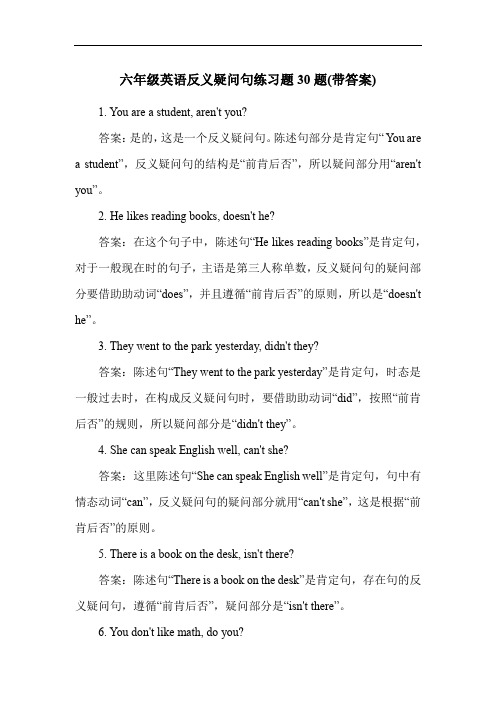
六年级英语反义疑问句练习题30题(带答案)1. You are a student, aren't you?答案:是的,这是一个反义疑问句。
陈述句部分是肯定句“ You are a student”,反义疑问句的结构是“前肯后否”,所以疑问部分用“aren't you”。
2. He likes reading books, doesn't he?答案:在这个句子中,陈述句“He likes reading books”是肯定句,对于一般现在时的句子,主语是第三人称单数,反义疑问句的疑问部分要借助助动词“does”,并且遵循“前肯后否”的原则,所以是“doesn't he”。
3. They went to the park yesterday, didn't they?答案:陈述句“They went to the park yesterday”是肯定句,时态是一般过去时,在构成反义疑问句时,要借助助动词“did”,按照“前肯后否”的规则,所以疑问部分是“didn't they”。
4. She can speak English well, can't she?答案:这里陈述句“She can speak English well”是肯定句,句中有情态动词“can”,反义疑问句的疑问部分就用“can't she”,这是根据“前肯后否”的原则。
5. There is a book on the desk, isn't there?答案:陈述句“There is a book on the desk”是肯定句,存在句的反义疑问句,遵循“前肯后否”,疑问部分是“isn't there”。
6. You don't like math, do you?答案:陈述句“You don't like math”是否定句,反义疑问句的结构是“前否后肯”,所以疑问部分是“do you”。
(完整word版)反义疑问句练习题(附答案).doc
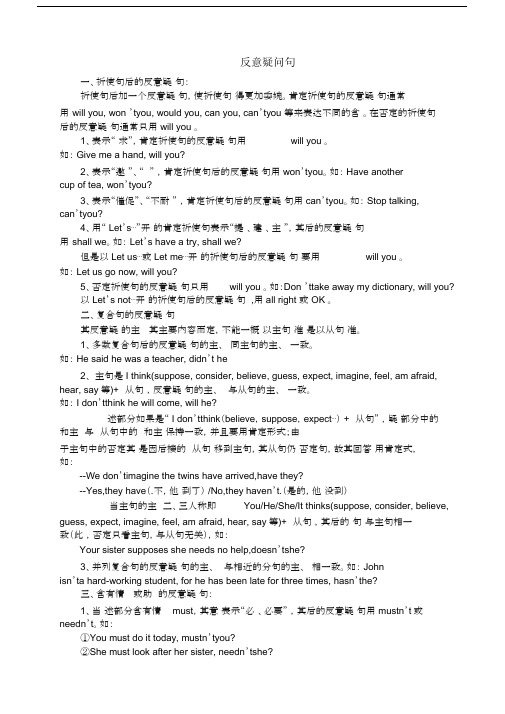
反意疑问句一、祈使句后的反意疑句:祈使句后加一个反意疑句,使祈使句得更加委婉。
肯定祈使句的反意疑句通常用will you, won ’tyou, would you, can you, can’tyou 等来表达不同的含。
在否定的祈使句后的反意疑句通常只用 will you 。
1、表示“ 求”,肯定祈使句的反意疑句用will you 。
如: Give me a hand, will you?2、表示“邀”、“ ” ,肯定祈使句后的反意疑句用 won’tyou。
如: Have anothercup of tea, won’tyou?3、表示“催促”、“不耐” ,肯定祈使句后的反意疑句用 can’tyou。
如: Stop talking,can’tyou?4、用“ Let’s⋯”开的肯定祈使句表示“提、建、主”,其后的反意疑句用shall we。
如: Let’s have a try, shall we?但是以 Let us⋯或 Let me⋯开的祈使句后的反意疑句要用will you 。
如: Let us go now, will you?5、否定祈使句的反意疑句只用will you 。
如:Don ’ttake away my dictionary, will you?以Let’s not⋯开的祈使句后的反意疑句 ,用 all right 或 OK 。
二、复合句的反意疑句其反意疑的主其主要内容而定,不能一概以主句准是以从句准。
1、多数复合句后的反意疑句的主、同主句的主、一致。
如: He said he was a teacher, didn’t he2、主句是 I think(suppose, consider, believe, guess, expect, imagine, feel, am afraid, hear, say等)+从句,反意疑句的主、与从句的主、一致。
如: I don’tthink he will come, will he?述部分如果是“ I don’tthink(believe,suppose,expect⋯) +从句” ,疑部分中的和主与从句中的和主保持一致,并且要用肯定形式;由于主句中的否定其是因后接的从句移到主句,其从句仍否定句,故其回答用肯定式,如:--We don’timagine the twins have arrived,have they?--Yes,they have(.不,他到了) /No,they haven’t.(是的,他没到)当主句的主二、三人称即You/He/She/It thinks(suppose, consider, believe, guess, expect, imagine, feel, am afraid, hear, say等)+从句,其后的句与主句相一致(此,否定只看主句,与从句无关),如:Your sister supposes she needs no help,doesn’tshe?3、并列复合句的反意疑句的主、与相近的分句的主、相一致。
(完整版)初中英语反义疑问句经典练习(含答案)(改)

反义疑问句练习题1.Lind.at.nothin.thi.morning.___.......A.didn’.sh. B.wa.sh. C.di.sh. D.wasn’.sh.2.There’.hardly__.mil.i.th.bottle._____there..A.no.isn’..B.some.i..C.little.isn’..D.any.i.3.H.ha.neve.ridde..hors.before.___..... A.doe.h..B.ha.h..C.hasn’.h..D.doesn’.h.4..H.seldo.cam.here._____...Ye.sir.. A.didn’.h..B.doe.h..C.doesn’.h..D.di.h.5.Everythin.seem.al.right.____........ A.doe.i..B.don’.the..C.won’.i..D.doesn’.i.7.On.can’.b.to.modest.ca.____....... A.on..B.h..C.i..D.w.8.N.on.faile.i.th.exam.____........ A.wa.h..B.di.on..C.di.the..D.didn’.h.11.H.can’.b.he.father.____.he........A.i..B.isn’..C.ca..D.can’.12.The.hav.n.tim.t.visi.th.museum._____..A.d.the..B.haven’.the..C.don’.the..D.wil.the.18.H.dislike.th.tw.subjects.____.he.....A.doe..B.doesn’..C.i..D.isn’.eles.now.____.......A.ar.the..B.aren’.the..C.i.i..D.isn’.i.23.Let’.g.ther.b.bus.___..........A.wil.yo..B.shal.w..C.don’.yo..D.wil.yo.24.Le.u.g.t.pla.football.___........ A.wil.yo..B.shal.w..C.d.w..D.ar.w.25.Don’.forge.t.giv.Poll.som.foo.an.chang.he.water._.A.wil.yo..B.shal.w..C.won’.yo..D.d.yo.26..Let’.g.shoppin.thi.afternoon._____.. .Al.right.A.wil.w..B.shal.w..C.don’.w..D.ar.w.27..Pas.m.th.dictionary._____...Yes.wit.pleasure.A.woul.yo..B.wil.yo..C.won’.yo..D.wouldn’.yo.30.Ther.i.littl.wate.i.th.glass.____.A.isn’.ther..B.isn’.i..C.i.i..D.i.ther.32.Ther.won’.b.an.concer.thi.Saturda.evening.____..A.wil.ther.no..B.wil.ther..C.i.ther..D.won’.33...gues.sh.taugh.hersel.Japanese.______.. .Yes. A.don’...B.di.sh..C.d...D.didn’.sh.34..don’.believ.yo.ar.right.____...........A.ar.yo..B.d.yo..C.won’.yo..D.d.35.Sh.doesn’.thin.tha.To.sing.bes.i.th.class.____..A.doe.sh..B.doesn’.sh..C.doe.h..D.doesn’.h.37..kno.yo.didn’.wan.t.hur.me.____........A.di.yo..B.didn’.yo..C.d...D.don’..38.I.m.fathe.wer.her.h.woul.b.ver.happy.____..A.weren’.h..B.wer.h..C.wouldn’.h..D.woul.h.1.It’.ver.ho.today, _______________ ........2. H.ca.spea.Chinese, _______________ ?3. Meime.studie.i..middl.school, _______________ .t., _______________ ?5.Don’t go ou.a.night, _______________ .......6.H.neve.love.col.weathe., _______________ ?7.Yo.finishe.th.tas.yesterday, _______________ ...9.To.ha.bee.t.Singapor., _______________ ?10.Th.story i.littl.interesting, _______________ ?11.Everythin.start.t.gro.i.spring, _______________ . 12.H.ca.hardl.finis.hi.homework, _______________ ?13.I’.i.Clas.3,Grad.2, _______________ ........14.Let’.g.shoppin., _______________ ?15.Sh.doesn’.lik.climbin.hill., _______________ .... 16..don’.thin.i.i.col.today, _______________ ?17.Yo.thin.h.i..goo.fligh.attendant,. _______________ .18.Nobod.know.wher.sh.lives, _______________ ?19.Fe.student.ca.answe.th.question, _______________ ..20.Mik.like.English. _______________ ?21.That was a wonderful night, _______________ ? 22.Your sister helped him, _______________ ?23.Tom is skating, _______________ ?24.You aren’t a teacher, _______________ ?25.They haven’t been to the Great Wall, _______________ ? 26.You will join the soccer team, _______________ ?27.He likes neither apples nor pears, _______________ ? 28.There are some good books for you, _______________ ?29.They have been there twice, _______________ ? 30.Let’s do it now, _______________ ?31.You dislike this kind of gifts, _______________ ? 32.Nothing is impossible, _______________ ?33.Everything is possible, _______________ ? 34.He doesn’t go to school by bus, _______________ ?35.There is little milk left in the bottle, _______________ ?36.Let us clean the classroom by ourselves, _______________ ?37.He has studied here for about four years, _______________ ?38.You have never lost money before, _______________ ?39.Few of them hurt themselves in the accident last night, _______________ ?40.Peter could hardly see the words on the blackboard, _______________ ?41.She’s American, _______________ ? 42.There will be a volleyball match in our school, _______________ ? 43.Don’t smoke in the reading-room, _______________ ? 44.I don’t think he is right, _______________ ?45.You must do your homework by yourself, _______________ ?46.You mustn’t touch the machine, _______________ ?47.He must be a worker, _______________ ? 48.Someone looked for me yesterday, _______________ ?49.I’m a teacher, _______________ ? 50.What a nice watch, _______________ ?51.I wish to use your ruler, _______________ ? 52.I have to stay at home, _______________ ?53.You’d better wear warm clothes today, _______________ ?54.What he needs is his parents’ love, _______________ ?55.You’d like a cup of tea, _______________ ? 56.Don’t be late again, _______________ ?57.Their prices are really low, _______________ ? 58.Reading is good for you to learn English, _______________ ? 59.No one knows about it, _______________ ? 60.I think you should study hard, _______________ ?Key: 1—5 CDBDD 6—10 BACDC 11—15 AABAB 16—20 CCBBA 21—25CDBAA 26—30 BBBAD 31—35 BBDAA 36—38 AAC附加答案:..isn’.it.. 2.can’.h.. 3.doesn’.she..4.doe.he... 5.wil.yo.6.does.he.7.didn’.you .8..isn’....9.hasn’.he...10.i.it11.doesn’t it 12.can he 13 .aren’t I 14.shall we 15.does she16.is it 17.don’t you18does it 19. can they 20.doesn’t he21.wasn’t it 22.didn’t she 23.isn’t he 24.are you 25.have they26.wont you 27.does he 28.aren’t there 29.haven’t they 30.shall we31.don’t you 32.is it 33.isn’t it 34.does he 35.is th ere36.will you 37.hasn’t he 38.have you 39.did they 40.could he41.isn’t she 42.won’t there 43.will you 44.is he 45.mustn’t you46.must you 47.isn’t he 48.didn’t they 49.aren’t I 50.isn’t it51.may I 52.don’t I 53.hadn’t you 54.isn’t it 55.wouldn’t you56.will you 57.aren’t they 58.isn’t it 59.do they 60.shouldn’t you。
完整版反义疑问句练习题和答案讲解
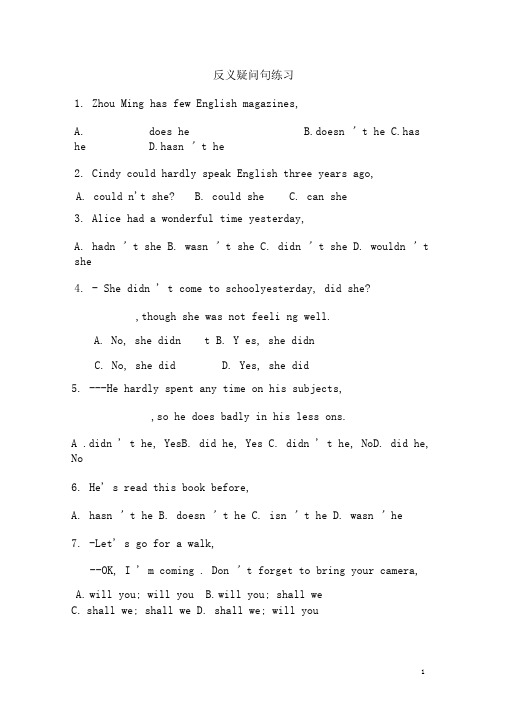
反义疑问句练习1.Zhou Ming has few English magazines,A.does heB.doesn ' t heC.has heD.hasn ' t he2.Cindy could hardly speak English three years ago,A. could n't she?B. could sheC. can she3.Alice had a wonderful time yesterday,A.hadn ' t sheB. wasn ' t sheC. didn ' t sheD. wouldn ' t she4.- She didn ' t come to schoolyesterday, did she?,though she was not feeli ng well.A. No, she didn tB. Y es, she didnC. No, she didD. Yes, she did5.---He hardly spent any time on his subjects,,so he does badly in his less ons.A .didn ' t he, YesB. did he, Yes C. didn ' t he, NoD. did he, No6.He' s read this book before,A.hasn ' t heB. doesn ' t heC. isn ' t heD. wasn ' he7.-Let' s go for a walk,--OK, I ' m coming . Don ' t forget to bring your camera,A.will you; will youB.w ill you; shall weC.shall we; shall weD. shall we; will you8.John had a short walk after lunch,A.did heB. did n't heC. had heD. had n't he9. Nancy hardly rings you up,A. doesn ' t sheB. does sheC. doesn ' t NancyD. does Nancy10. ---Your brother often disagrees with you, .We ofte n have differe nt opinions.A.does; YesB. doesn ' t ;YesC. does; NoD. doesn ' t; No11. Kate ' s neverlate for school,A.isn ' t sheB.hasn ' theC.is she 12. --- Liu Tao has never read the book The Adventure of TomSawyer ,he?.He told me it's very in terest ing. He'd like toread it aga in.C. is n ' t; Yes, he isD. has n ' t; No, he has n't13. — He s never late for school,—No, he isn ' t .He is alwaysearly.B. isn ' t heC. hasn ' t heD. has he14. — There ' s little meat left in the fridge,.I ' ll get some on my way home.A. is there, YesB. isn ' t there, YesC. is there, NoD. isn ' t there, No15. — Tom finished his homework, didn ' t he?he ?D.has sheA. is; No, he isn'tB. has; Yes, he hasA. is he,though he was ill yesterday.A. No, he didn ‘BtYes, he did C. Yes, he does D. No, he doesn16.There is little water in the cup,A. is thereB. isn ' t thereD. isn ' t it D. is it17.He' s stiinot un derstood by his close friend although hehas said sorryto him,A. has n t heB. has heC. is n t heD. is heA. didB. didn tC. haveD. haven ‘t you?18.You have n ever visited the p lace before,19. Don't kee p poison in the kitche n,A. do youB. shall weC. will youD.don't you20. There are no museums in our city,A. aren ' t thBr^re thereC. is thereD. isn ' t there21.Your father is playing the piano very well, h e?A.isB.isn ' tC.doesD.doesn 't22.— It ' s her birthday tomorrow,——Yes, let ' s have a surprise party for her.A. isn ' tBt isn ' t sheC. doesn ' t iD. doesn ' t she23.--- He' s never stolen anything before, he?.It Issthird time to be take n to the p olice statio n.A. has n t; Y esB. has; NoC. didn't heD. hadn't he24.— It ' s her birthday tomorrow, — Yes, let ' s have asurprise party for her.A. isn ' tBit. isn ' t sheC. doesn ' t iDt . doesn ' t she25. -- Your father never watched the drama series on TV,. He thinks theses drama series areboringand dull.A.does he; Yes, he does.B. does he; No, he doesnC. doesn ' t he ; Yes, he does.D. doesn ' t he ; No, he doesn 26. — Tom is an honest boy, — Yes. We trust him all the time. A. isn 't B. is27.Good, you ' ve done it well! You need no more help fromus,C. don ' t youD. needn ' t you28. His father had an important meeting just now,C. has; YesD. is; Nohe?C. doesD. doesn 't.A. do youB. need youA. did heB. had he29.-- You used to be short, didn ' t you?. I was the shortest in my class.A. Yes, I did.B. No, I didn t.C. Yes, I was.D. No, I wasn ' t.30.The farmer is working now. He 's fed the horse and the sheep,A. doesn ' t heB. isn ' t heC. wasn ' t heD.hasn ' t he参考答案1.A解析】试题分析:句意为:周明几乎没有英语杂志对吗?这是一个反义疑问句,反义疑问句的结构遵循前肯定后否定或者前否定后肯定,前后人称、时态一致的原则。
反义疑问句练习题及答案解析

反义疑问句练习题及答案解析反义疑问句是英语语法中的一种问句形式,用于在表达某种观点或态度时,征求对方的认同或否认。
反义疑问句通常由两个部分组成,主句和从句,其中主句陈述事实,并以逗号结尾,从句是对主句的反问。
以下是一些反义疑问句的练题及答案解析:1. He is a doctor, isn't he?答案:是解析:句子的主语是 "He",陈述了 "He" 是一个医生。
主句以逗号结尾,从句表达了 "He" 是一个医生这一观点,并征求对方的认同。
2. They don't like coffee, do they?答案:否解析:句子的主语是 "They",陈述了 "They" 不喜欢咖啡。
主句以逗号结尾,从句表达了 "They" 不喜欢咖啡这一观点,并征求对方的否认。
3. You can swim, can't you?答案:是解析:句子的主语是 "You",陈述了 "You" 能游泳。
主句以逗号结尾,从句表达了 "You" 能游泳这一观点,并征求对方的认同。
4. She hasn't finished her homework, has she?答案:否解析:句子的主语是"She",陈述了"She" 没有完成她的作业。
主句以逗号结尾,从句表达了 "She" 没有完成她的作业这一观点,并征求对方的否认。
5. He won't be late, will he?答案:否解析:句子的主语是 "He",陈述了 "He" 不会迟到。
主句以逗号结尾,从句表达了"He" 不会迟到这一观点,并征求对方的否认。
(完整)反义疑问句讲解和练习(答案)
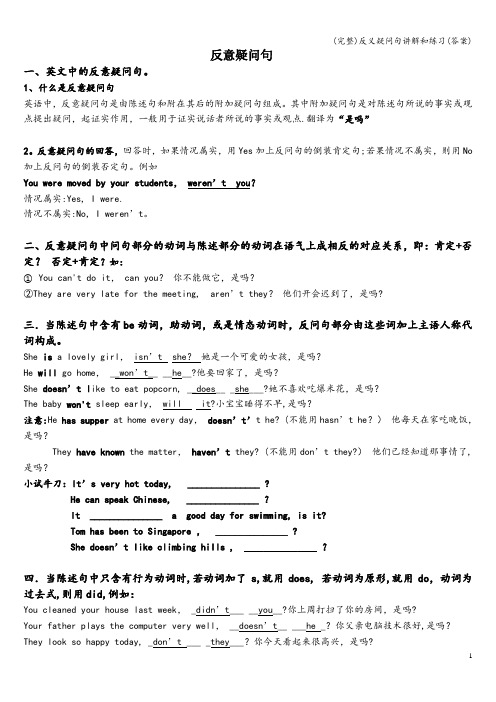
反意疑问句一、英文中的反意疑问句。
1、什么是反意疑问句英语中,反意疑问句是由陈述句和附在其后的附加疑问句组成。
其中附加疑问句是对陈述句所说的事实或观点提出疑问,起证实作用,一般用于证实说话者所说的事实或观点.翻译为“是吗”2。
反意疑问句的回答,回答时,如果情况属实,用Yes加上反问句的倒装肯定句;若果情况不属实,则用No 加上反问句的倒装否定句。
例如You were moved by your students,weren’t you?情况属实:Yes, I were.情况不属实:No, I weren’t。
二、反意疑问句中问句部分的动词与陈述部分的动词在语气上成相反的对应关系,即:肯定+否定?否定+肯定?如:①You can't do it, can you?你不能做它,是吗?②They are very late for the meeting, aren’t they?他们开会迟到了,是吗?三.当陈述句中含有be动词,助动词,或是情态动词时,反问句部分由这些词加上主语人称代词构成。
She is a lovely girl,isn’t she?她是一个可爱的女孩,是吗?He will go home, __won’t__ __he__?他要回家了,是吗?She doesn’t l ike to eat popcorn, __does__ _she___?她不喜欢吃爆米花,是吗?The baby won't sleep early, will it?小宝宝睡得不早,是吗?注意:He has supper at home every day,doesn’t’t he? (不能用hasn’t he?)他每天在家吃晚饭,是吗?They have known the matter,haven’t they? (不能用don’t they?)他们已经知道那事情了,是吗?小试牛刀:It’s very hot today, _______________ ?He can speak Chinese, _______________ ?It _______________ a good day for swimming, is it?Tom has been to Singapore , _______________ ?She do esn’t like climbing hills , _______________ ?四.当陈述句中只含有行为动词时,若动词加了s,就用does, 若动词为原形,就用do,动词为过去式,则用did,例如:You cleaned your house last week, _didn’t___ __you__?你上周打扫了你的房间,是吗?Your father plays the computer very well, __doesn’t__ ___he _?你父亲电脑技术很好,是吗?They look so happy today, _don’t ___ _they___?你今天看起来很高兴,是吗?小试牛刀: Meimei studies in a middle school, _______________ ?He loves cold weather , _______________ ?You finished the task yesterday, _______________ ?五.反意疑问句的陈述部分带有little, few, never, hardly, seldom,nobody, nothing,barely, scarcely等否定意义的词时,问句部分用肯定式.如:①She never tells a lie, does she?(不用doesn’t she?)她从不说谎,是吗?②He was seldom late, was he?(不用wasn’t he?) 他几乎不迟到,是吗?小试牛刀:Few students can answer the question, _______________ ?He can hardly finish his homework, _______________ ?六、反意疑问句的陈述部分为I am……时,问句部分习惯上用aren’t I?表示.如:I am a very honest man, aren’t I? 我是个很诚实的人,是吗?小试牛刀:I’m in Class 3,Grade 2, _______________ ?I’m ten years old, _______________ ?七.陈述部分的主语为不定代词something, anything, nothing, everything时,问句部分的主语用it。
反义疑问句用法及练习题(附答案)
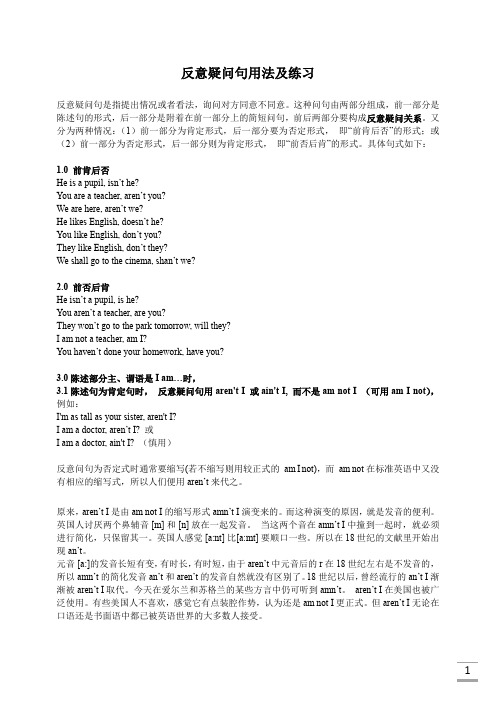
反意疑问句用法及练习反意疑问句是指提出情况或者看法,询问对方同意不同意。
这种问句由两部分组成,前一部分是陈述句的形式,后一部分是附着在前一部分上的简短问句,前后两部分要构成反意疑问关系。
又分为两种情况:(1)前一部分为肯定形式,后一部分要为否定形式,即“前肯后否”的形式;或(2)前一部分为否定形式,后一部分则为肯定形式,即“前否后肯”的形式。
具体句式如下:1.0 前肯后否He is a pupil, isn’t he?You are a teacher, aren’t you?We are here, aren’t we?He likes English, doesn’t he?You like English, don’t you?They like English, don’t they?We shall go to the cinema, shan’t we?2.0 前否后肯He isn’t a pupil, is he?You aren’t a teacher, are you?They won’t go to the park tomorrow, will they?I am not a teacher, am I?You haven’t done your homework, have you?3.0陈述部分主、谓语是I am…时,3.1陈述句为肯定句时,反意疑问句用aren't I 或ain't I, 而不是am not I (可用am I not),例如:I'm as tall as your sister, aren't I?I am a doctor, aren’t I?或I am a doctor, ain't I? (慎用)反意问句为否定式时通常要缩写(若不缩写则用较正式的am I not),而am not在标准英语中又没有相应的缩写式,所以人们便用aren’t来代之。
- 1、下载文档前请自行甄别文档内容的完整性,平台不提供额外的编辑、内容补充、找答案等附加服务。
- 2、"仅部分预览"的文档,不可在线预览部分如存在完整性等问题,可反馈申请退款(可完整预览的文档不适用该条件!)。
- 3、如文档侵犯您的权益,请联系客服反馈,我们会尽快为您处理(人工客服工作时间:9:00-18:30)。
反意疑问句一、祈使句后的反意疑问句:祈使句后加一个反意疑问句,使祈使句变得更加委婉。
肯定祈使句的反意疑问句通常用will you, won’t you, would you, can you, can’t you等来表达不同的含义。
在否定的祈使句后的反意疑问句通常只用will you。
1、表示“请求”,肯定祈使句的反意疑问句用will you。
如:Give me a hand, will you?2、表示“邀请”、“劝诱”时,肯定祈使句后的反意疑问句用won’t you。
如:Have another cup of tea, won’t you?3、表示“催促”、“不耐烦”时,肯定祈使句后的反意疑问句用can’t you。
如:Stop talking, can’t you?4、用“Let’s…”开头的肯定祈使句表示“提议、建议、主张”,其后的反意疑问句用shall we。
如:Let’s have a try, shall we?但是以Let us…或Let me…开头的祈使句后的反意疑问句则要用will you。
如:Let us go now, will you?5、否定祈使句的反意疑问句只用will you。
如:Don’t take away my dictionary, will you?以Let’s not…开头的祈使句后的反意疑问句,用all right或OK。
二、复合句的反意疑问句其反意疑问的主谓语视其主要内容而定,不能一概说以主句为准还是以从句为准。
1、多数复合句后的反意疑问句的主、谓语同主句的主、谓语一致。
如:He said he was a teacher, didn’t he2、①主句是I think(suppose, consider, believe, guess, expect, imagine, feel, am afraid, hear, say等)+宾语从句时,反意疑问句的主、谓语应与从句的主、谓语一致。
如:I don’t think he will come, will he?②陈述部分如果是“I don’t think(believe,suppose,expect…)+宾语从句”时,疑问部分中的动词和主语应与宾语从句中的动词和主语保持一致,并且要用肯定形式;由于主句中的否定其实是因后接的宾语从句转移到主句,其从句仍为否定句,故其回答应用肯定式,如:--We don’t imagine the twins have arrived,have they?--Yes,they have.(不,他们到了)/No,they haven’t.(是的,他们没到)③当主句的主语为二、三人称即You/He/She/It thinks(suppose, consider, believe, guess, expect, imagine, feel, am afraid, hear, say等)+宾语从句时,其后的问句应与主句相一致(此时,否定只看主句,与从句无关),如:Your sister supposes she needs no help,doesn’t she?3、并列复合句的反意疑问句的主、谓语应与相近的分句的主、谓语相一致。
如:John isn’t a hard-working student, for he has been late for three times, hasn’t he?三、含有情态动词或助动词的反意疑问句:1、当陈述部分含有情态动词must,其意义表示“必须、必要”时,其后的反意疑问句用mustn’t或needn’t。
如:①You must do it today, mustn’t you?②She must look after her sister, needn’t she?如果must的含义表示“一定是、想必”等推测意义时,其后的反意疑问句则要依据句中的谓语动词的时态结构采用be/have/did/do+not等相应形式。
如:①He must bee ill, isn’t he?②You must have seen the film before, haven’t you?2、如果陈述部分用了must have+P.P.(过去分词),但明示或暗示了过去的时间,其反意疑问句用过去时。
如:He must have seen him yesterday, didn’t he?3、陈述部分含情态动词ought to,其后反意疑问句用oughtn’t或shouldn’t.如:I ought to come here, oughtn’t I?4、陈述部分含情态动词used to其后反意疑问句用usedn’t或didn’t均可。
如:Tom used to live here, usedn’t he?5、陈述部分含有have/has/had to时,其后的反意疑问句用do的相应形式。
如:You have to go, don’t you?但是在陈述句中用have/has/had got to来代替have/has/had to时,反意疑问句用have 的相应形式。
如:Ann has got to see a doctor, hasn’t she?6、陈述部分有had better/would rather时,其后的反意疑问句用hadn’t/wouldn’t。
如:①You’d better not stay here, had you?②They would rather take this one, wouldn’t they?7、当陈述部分有dare或need时,若dare和need为实义动词疑问部分的谓语用do的适当形式;若dare和need为情态动词,疑问部分用dare和need构成。
Need与Dare 用法区别一、need的用法1)need可用作实义动词,意为"需要;必要",后面可接名词、动名词或动词不定式等作宾语。
注意"need doing"表示被动意义,相当于need to be done。
例如:I need a dictionary, so I need to go to the bookstore. 我需要一本词典,因此我要去趟书店。
How often does your hair need washing(need to be washed)? 你的头发需要多久洗一次?2)need可用作情态动词,通常用于疑问句和否定句中,后接动词原形。
这时need没有人称和数的变化,也没有时态的变化。
例如:It's only eight o'clock. Need you go so early? 才八点。
你需要去这么早吗?You needn't tell him about it as I have told him. 你不必跟他说那件事,我已经告诉他了。
3)needn't do与needn't have done的区别:两者都表示"不必做......"。
但前者表示现在或将来不必做;而后者表示"过去(本来)不必做(而事实上已经做了)"。
例如:You needn't carry the desks out of the classroom when you clean the classroom. 你打扫教室时不必把桌子搬到教室外。
You needn't have bought such a big TV as it takes too much room. 你本来不必买这么大的电视,它占据的空间太大了(而事实上已经买了)。
二、dare的用法1)dare用作实义动词,此时其后的动词不定式可带to也可不带to,且dare有人称和数以及时态的变化。
例如:I dare to jump down from the top of the wall. 我敢从那墙头上跳下来。
She doesn't dare (to) meet her teacher's eyes. 她不敢与老师对视。
2)dare用作情态动词,后跟动词原形,主要用于疑问句、否定句和条件句中。
例如:How dare she do things like that to me? 她怎么敢对我做那种事?-Dare you catch the mouse? 你敢去抓那只老鼠吗?-I daren't do that. 我不敢抓。
If you dare say that to our teacher, I would vote for you. 如果你敢向我们的老师说那件事,我就投你一票。
四、陈述句主语是某些不定代词的反意疑问句:1、陈述句部分主语是everything, something, anything, nothing时,其后的反意疑问句主语用it。
如:①Everything seems all right, doesn’t it?②Nothing is in the box, is it?2、陈述部分的主语是everybody, somebody, anybody, nobody, everyone, no one, none, either, some one时,其后的反意疑问句用主语they以兼顾所指代的男、女两性。
如:Everybody has got the new books, haven’t they?3、陈述部分主语是不定代词one时,其后的反意疑问句一般用主语one。
如:One can’t be always careful, can one?五、含有否定词或半否定词的反意疑问句:1、陈述部分含有no, never, seldom, hardly, rarely, scarely, few, little等否定或半否定意义的词时,都视为否定,故反意疑问句部分用肯定形式。
如:Few people knew the answer, did they?2、如果陈述部分的否定意义只是由单词加否定前缀构成时,其后的反意疑问句一般要用否定形式。
如:He is unhappy, isn’t he?六、陈述部分的主语是指示代词的反意疑问句:1、陈述部分主语是指示代词this, that时,其后的反意疑问句用主语it。
如:This is important, isn’t it?2、陈述部分主语是指示代词these, those时,其后的反意疑问句用主语they。
如:Those are mine, aren’t they?七、反意疑问句的其他特殊形式:1、陈述部分是“I’m…”结构时,其后的反意疑问句用aren’t I?如:I am a student, aren’t I ?2、陈述部分是there be或there live, there stand, there used to be等结构时,其后的反意疑问句用主语there。
